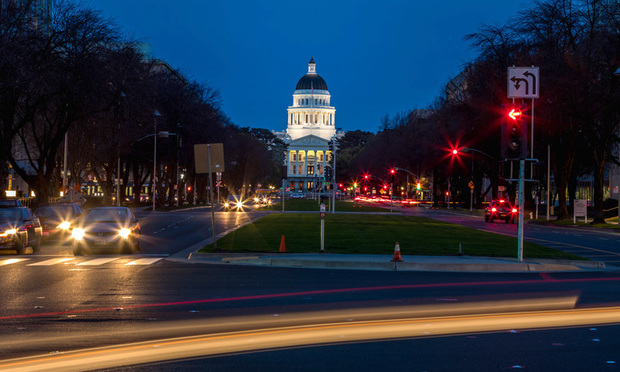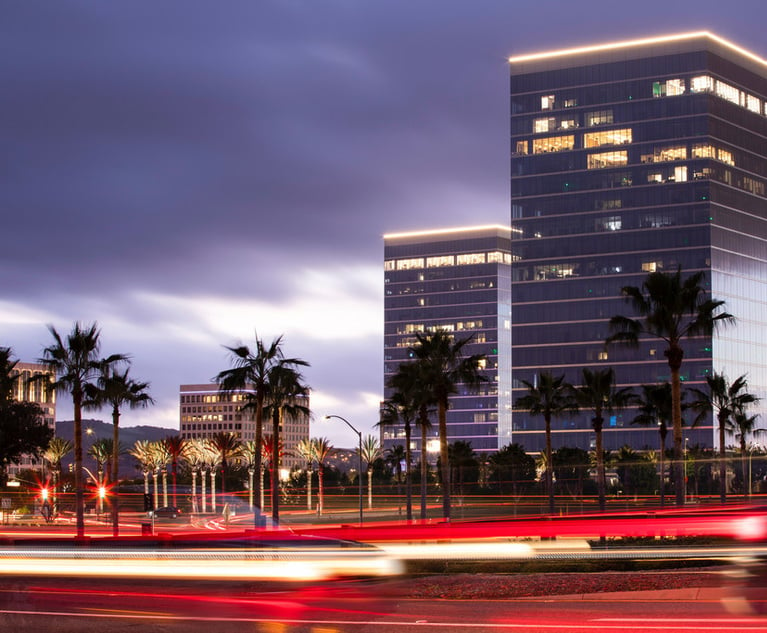No Bar Dues Hike Expected, but Here Are Some Changes You'd See
Calling yourself a California bar "member" would be a thing of the past.
May 04, 2018 at 07:15 PM
3 minute read
 Sacramento State Capitol building on Capitol Way. Credit: Jason Doiy/ Recorder
Sacramento State Capitol building on Capitol Way. Credit: Jason Doiy/ Recorder Bar dues are unlikely to increase for California lawyers in 2019 despite a push by state bar leaders to raise them.
Recently drafted annual bar dues legislation, scheduled for its first policy committee review on Tuesday, would keep the tab for active members at $390. Bar leaders had sought more revenue for disciplinary work and employee costs.
A tentative labor agreement approved by the bar's board of trustees in January promised workers a pay bump if the Legislature approved a dues fee hike of $20 or more. A subsequent amendment to the agreement dated April 18 and signed by bar management and the union representing bar workers said employees will receive a 3.5 percent cost of living adjustment “lump sum” in January 2020, with no mention of securing a legislatively approved dues hike first.
Both sides have agreed to seek a bar dues fee increase in 2020 “that is both meaningful and sustainable and that ensures that the state bar will be able to carry out its public protection mission and appropriately invest in its workforce.”
 Mark Stone.
Mark Stone.Assemblyman Mark Stone, D-Scotts Valley, whose judiciary committee is carrying the dues legislation this year, told The Recorder in March that he was hoping to pass a largely status quo bill that would allow the substantial changes enacted by the Legislature last year to take effect.
The bill does propose some changes to bar operations:
- It asks the bar to develop a rule that would allow lawyers to receive continuing legal education credit for certain pro bono work. The program would supplant pending legislation that would require attorneys to provide 25 hours of free legal services each year or pay a $500 in-lieu fee to the state's legal aid program. The 2019 bar bill would also track the amount of pro bono work generated by the rule.
- It requires the bar to contract with the state auditor to review the agency's operations and report back to the Legislature by July 2019. The auditor's findings could be used in setting the 2020 dues level.
- California lawyers would be called “licensees” instead of bar “members.” Dues would become fees. The changes are keeping in line with legislative efforts to recast the bar as a public oversight agency instead of a professional advocacy organization.
- It requires the bar to develop a plan to increase diversity in the legal profession. The review may include analyzing the impact of California's high bar exam pass score, the bill says.
- It would make it easier for the bar to place a lawyer on inactive status for wrongdoing.
A spokeswoman for the bar said agency leaders have been involved in negotiations over the bill but have not taken an official position on it.
This content has been archived. It is available through our partners, LexisNexis® and Bloomberg Law.
To view this content, please continue to their sites.
Not a Lexis Subscriber?
Subscribe Now
Not a Bloomberg Law Subscriber?
Subscribe Now
NOT FOR REPRINT
© 2025 ALM Global, LLC, All Rights Reserved. Request academic re-use from www.copyright.com. All other uses, submit a request to [email protected]. For more information visit Asset & Logo Licensing.
You Might Like
View All
Buchalter Hires Longtime Sheppard Mullin Real Estate Partner as Practice Chair

Reality TV Couple and Pacific Palisades Neighbors Sue City of Los Angeles Over Loss of Homes to Fire
3 minute read
In Resolved Lawsuit, Jim Walden Alleged 'Retaliatory' Silencing by X of His Personal Social Media Account

No Two Wildfires Alike: Lawyers Take Different Legal Strategies in California
5 minute readTrending Stories
- 1Navigating AI Risks: Best Practices for Compliance and Security
- 220 New Judges? Connecticut Could Get Wave of Jurists
- 3Orrick Loses 10-Lawyer Team to Herbert Smith in Germany
- 4‘The US Market Is Critical’: KPMG’s Former Head of Global Legal Services On the Legal Arm of the Big Four Firm Entering the US
- 5Justice Marguerite Grays Elevated to Co-Chair Panel That Advises on Commercial Division
Who Got The Work
J. Brugh Lower of Gibbons has entered an appearance for industrial equipment supplier Devco Corporation in a pending trademark infringement lawsuit. The suit, accusing the defendant of selling knock-off Graco products, was filed Dec. 18 in New Jersey District Court by Rivkin Radler on behalf of Graco Inc. and Graco Minnesota. The case, assigned to U.S. District Judge Zahid N. Quraishi, is 3:24-cv-11294, Graco Inc. et al v. Devco Corporation.
Who Got The Work
Rebecca Maller-Stein and Kent A. Yalowitz of Arnold & Porter Kaye Scholer have entered their appearances for Hanaco Venture Capital and its executives, Lior Prosor and David Frankel, in a pending securities lawsuit. The action, filed on Dec. 24 in New York Southern District Court by Zell, Aron & Co. on behalf of Goldeneye Advisors, accuses the defendants of negligently and fraudulently managing the plaintiff's $1 million investment. The case, assigned to U.S. District Judge Vernon S. Broderick, is 1:24-cv-09918, Goldeneye Advisors, LLC v. Hanaco Venture Capital, Ltd. et al.
Who Got The Work
Attorneys from A&O Shearman has stepped in as defense counsel for Toronto-Dominion Bank and other defendants in a pending securities class action. The suit, filed Dec. 11 in New York Southern District Court by Bleichmar Fonti & Auld, accuses the defendants of concealing the bank's 'pervasive' deficiencies in regards to its compliance with the Bank Secrecy Act and the quality of its anti-money laundering controls. The case, assigned to U.S. District Judge Arun Subramanian, is 1:24-cv-09445, Gonzalez v. The Toronto-Dominion Bank et al.
Who Got The Work
Crown Castle International, a Pennsylvania company providing shared communications infrastructure, has turned to Luke D. Wolf of Gordon Rees Scully Mansukhani to fend off a pending breach-of-contract lawsuit. The court action, filed Nov. 25 in Michigan Eastern District Court by Hooper Hathaway PC on behalf of The Town Residences LLC, accuses Crown Castle of failing to transfer approximately $30,000 in utility payments from T-Mobile in breach of a roof-top lease and assignment agreement. The case, assigned to U.S. District Judge Susan K. Declercq, is 2:24-cv-13131, The Town Residences LLC v. T-Mobile US, Inc. et al.
Who Got The Work
Wilfred P. Coronato and Daniel M. Schwartz of McCarter & English have stepped in as defense counsel to Electrolux Home Products Inc. in a pending product liability lawsuit. The court action, filed Nov. 26 in New York Eastern District Court by Poulos Lopiccolo PC and Nagel Rice LLP on behalf of David Stern, alleges that the defendant's refrigerators’ drawers and shelving repeatedly break and fall apart within months after purchase. The case, assigned to U.S. District Judge Joan M. Azrack, is 2:24-cv-08204, Stern v. Electrolux Home Products, Inc.
Featured Firms
Law Offices of Gary Martin Hays & Associates, P.C.
(470) 294-1674
Law Offices of Mark E. Salomone
(857) 444-6468
Smith & Hassler
(713) 739-1250






